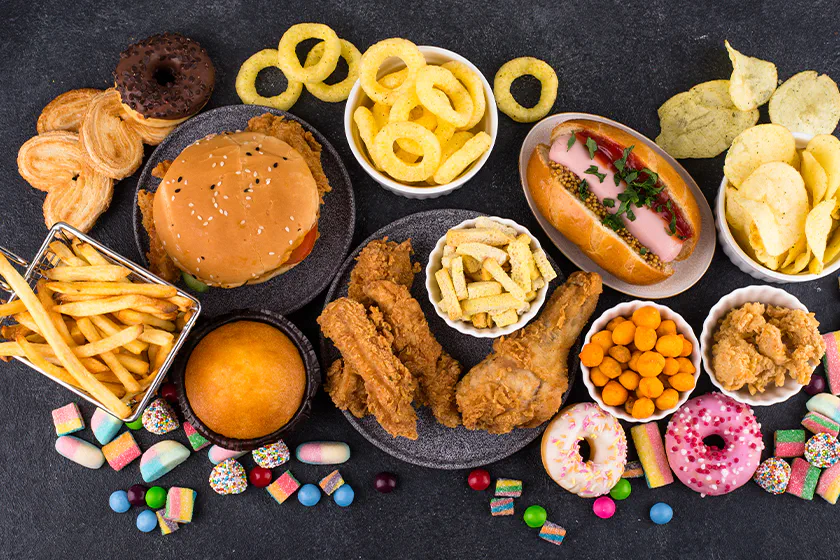How Ultraprocessed Food Can Make Menopause Symptoms Worse

Can Flamin’ Cheetos lead to flamin’ hot flashes?
When you put food in a hierarchy from most to least healthy, ultraprocessed foods fall somewhere at the bottom, right above eating lead paint. This is an exaggeration, but sadly, it’s not far off the mark. Ultraprocessed foods are very damaging to the human body, and they’re especially problematic for people in menopause.
Research has found that menopausal women who eat more junk food have more problems with hot flashes, more trouble with memory and concentration, and poorer sexual functioning.
So, let’s take a look at what ultraprocessed foods are and how they make everything about “puberty in reverse” AKA menopause worse.
What Are Ultraprocessed Foods?
If you’re trying to get fitter, you are probably trying to clean up your diet. You know that Big Macs aren’t good for you, but shockingly, that yogurt you’ve been eating for lunch may not be either!
Dietary choices can get murky thanks to how food companies market “healthy” foods. Some supposedly “healthy” choices are anything but. For instance, most flavored yogurts are loaded with sugar, preservatives, and stabilizers. This isn’t true of plain yogurt, which is a much better choice.
So, for starters, what are ultraprocessed foods?
Most foods are processed to a degree. “Processed” just means altered or changed in some way, and cooking could be considered a kind of processing. But ultraprocessed foods are science experiments that contain some natural components of real food as well as a lot of *unnatural *ingredients like additives, preservatives, and dyes that your body doesn’t digest well.
These foods have a very convoluted production process where ingredients are molecularly broken down and recombined to maximize taste, visual appeal, and aroma. They are meant to be addictive because they are loaded with fat, sugar, and sodium, and low in fiber, protein, and most vitamins.
While they may taste good, they aren’t anything that you or your grandma could make in your own kitchen. Flamin’ Cheetos DO NOT exist in nature!
But sometimes, you may not know that what you’re eating* is* ultraprocessed. Many of these foods fly under the radar. They can be packaged to appear like healthy food options and marketed as “all natural”.
Some of the most processed foods in your local grocery store are protein bars, yogurt, and sugary cereals. So read food labels carefully. If a label has a ton of ingredients, most of which you can’t pronounce, it’s more than likely highly processed.
How Ultraprocessed Foods Affect Menopause
Ultraprocessed foods can wreak havoc on menopausal bodies. Here are some consequences.
Your expanding waistline
Our entire world is getting fatter. According to research, globally, obesity has more than doubled in the last 30 years. Due to the decline in reproductive hormones, menopausal women are at risk for weight gain, but this risk goes up when you consume a lot of ultraprocessed foods like cookies and white bread.
More hot flashes
Hot flashes and other vasomotor issues are among the most common symptoms menopausal women experience. Most women who are transitioning through menopause will experience them, and some women have them often. They are caused by the decrease in estrogen but eating crap plays a role as well.
If you are waking up every night drenched in sweat, take a look at your diet. Eating a lot of ultraprocessed foods that are loaded with sugar can make this symptom much worse. So, skip the pastry, and eat more whole foods like fruits, veggies, and lean protein.
Increased risk for disease
Ultraprocessed foods can increase the risk of disease for anyone of any gender or age. Diseases that can be increased by ultraprocessed foods include:
- High blood pressure
- Cardiovascular disease
- Increased risk of stroke
- Cancer
- Metabolic syndrome
- Shortened life-span
Bottom Line
If you are in menopause, you already know that it’s a challenging life event all by itself! Ultraprocessed foods add fuel to the fire. These foods are loaded with weird ingredients that your body can’t handle well. Plus, the high levels of sugar, unhealthy fats, and artificial additives increase the risk that you will have more hot flashes, mood swings, sleep disturbances, and joint pain. So, skip the Cheetos, eat more whole foods, and say hello to dryer bed covers.
Kaye Smith, PhD, is a seasoned behavioral health coach and psychologist with a specialization in women’s sexual health. With 20+ years of experience spanning psychotherapy, academia, and content development, she supports women managing anxiety, depression, stress, and menopause. Dr. Smith has contributed to the work of renowned sexologist Dr. Betty Dodson and written for platforms including Hello Clue, O.school, and Medium. Leveraging expertise in CBT, mindfulness, and motivational interviewing, she delivers clear, evidence-based insights on mental health and wellness.



